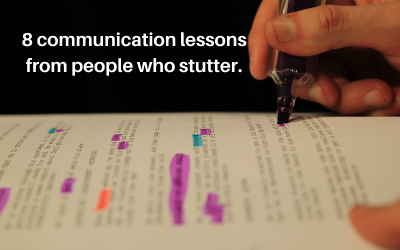“Having confidence in your natural abilities will help you reach your potential as a public speaker.”
I caught a glorious staging of the classic musical My Fair Lady while visiting San Francisco recently which made me ponder the importance of authenticity in public speaking.
In this modern take on the story of a pompous linguist who wages a bet that he can convert a lowly and foul-mouthed London flower seller into a well-spoken lady, the student rejects her teacher’s desire to make her a trophy of his success. Eliza Doolittle loses her Cockney accent but finds her true voice. She claims her personal freedom and identity by simply walking away from Professor Higgins at the end.
Phonetic exercises like “The rain in Spain stays mainly in the plain,” may have given Eliza the pronunciation and manners to move up in British society, but they did not change who she was inside. That brought to my mind the common misconception among public speaking students that they need to adopt affected speech patterns to succeed.
When I coach business leaders, I often hear: “I want to learn to speak like you, Rosemary.” That is not possible, I respond. “My goal is to make you the best version of you possible when it is time to speak or present in public.”
Here is why:
“Be yourself; everyone else is already taken.”
Oscar Wilde
1. You are unique. There is only one of you.
You and who you are make the difference when you speak. Your pitch, rate of speech, volume, inflection, articulation, overall vocal variety, and accent are part of the individual tendencies that comprise your natural style. As your public speaking abilities evolve, you learn how and when to use those characteristics to the greatest effect to persuade, inform and inspire your audience.
You may think that you need to sound like a newscaster or stage actor to deliver a good speech or presentation. Wrong. That may be the worst thing you can do. Instead of charming, enlightening and entertaining, you may sound robotic and boring. Who you are is essential to your ability to bring your ideas to life.
Imagine giving a presentation at a professional conference, virtually or in person, and wearing borrowed shoes that are a size too small. Your feet hurt, and the pain will show on your face, demeanor, and delivery. Similarly, speaking with someone else’s voice can hurt your credibility. Your audience will notice your unease and pretense.
Great communicators are comfortable in their own skin. They are self-aware, poised, and empathetic towards their audience. They demonstrate knowledge and love of the topic and are genuinely interested in touching the hearts and minds of their listeners.
When you present at a board meeting, press conference, all-hands meeting, or industry conference, your audience is there to experience you. That is why you are at the lectern or in front of the webcam and not someone else.

“If you wish to win a man over to your ideas,
Abraham Lincoln
first make him your friend.”
2. Your non-verbal communication matters as much as
your vocalization.
Your face can make thousands of expressions, but you may be unaware of most of them. These are as uniquely yours as your hair, skin tone, eye color and body type. If you add voluntary gestures to your physical characteristics, such as a smile or head nod, you will tap some of your most valuable communications assets.
Body language has been shown to increase comprehension and retention of verbal messages by a factor of 65 percent. In other words, how your body moves directly complements what you say and what your audience will receive.
Personal appearance, posture, movement, gestures, voice, and facial expressions all act in concert to support your purpose as a speaker and are among the essential elements of good delivery. These become more pronounced on video conferences where every movement is magnified on the small screen.
And let us not forget your eye contact. In person, eye contact behavior shows you are interested, honest and credible. If not, you run the risk of being seen as uninterested, dishonest, or even devious. When you speak to online audiences, this principle is doubly important.
How do you make eye contact with a virtual audience? Learn to love the webcam and make it your best friend. Imagine that all the wonderful people watching you are literally inside that webcam. Try it, it works.
“Imperfection is beauty, madness is genius, and it’s better to be absolutely ridiculous than absolutely boring.”
Marilyn Monroe
3. Your audience will trust you more if you are imperfect.
So, you fumbled a line or showed the wrong PowerPoint slide. The world will not end. On the contrary, if you go with the flow your audience will appreciate your candor and like you more. They are on your side and your imperfection only makes you more human, vulnerable, and likeable.
I tell my clients that a natural and sincere state of mind is perceived by your listeners whether you are speaking in person or virtually. Personality, charisma, and expertise combine to enhance your executive presence and authority.
Attitude is more important than aptitude when it comes to your ability to influence others. Show them that you care, and they will be on your side despite what may go wrong–as often happens with live events in person or streamed.
Communications training builds on the speaking strengths you already possess and adds new skills to enhance your natural style, which may include regional and non-English accents.
I have clients who are native Spanish speakers and are challenged by high-stakes presentations in English. My approach is to recognize that their accent is part of their personal charm and identity.
Effective personalized coaching will help you articulate in ways that ensure that you will be understood on any stage. It means speaking more slowly or replacing multisyllable words with simpler ones that roll more easily off your tongue. Shorter sentences, more breaths and pauses for emphasis—all can turn an accent into an asset whether on Zoom or in person.
Learn to love the sound of your voice. That self-awareness is a first step to improve your diction, intonation, pacing and other skills that will ensure that you are clear and impactful.
In the original version of My Fair Lady and the magnificent film adaptation starring Audrey Hepburn, the ending is unclear. Eliza may or may not seek independence from Higgins. I prefer to imagine she chose not to remain his creation but to speak in her own voice.
Powerful public speaking starts on the inside. Why would you want to sound like someone else? Find your true voice. Allow your inner brilliance to guide you towards powerful and transformative public speaking. Learn to speak like yourself and no one else.





